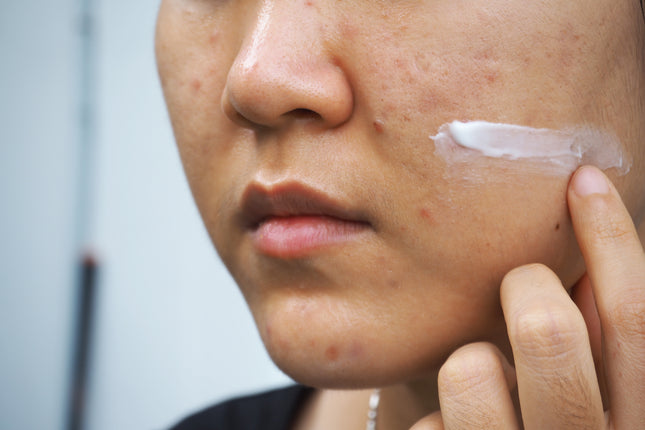
Dealing with acne scars can be a daunting task, but with the right treatments, achieving smoother and clearer skin is possible. Dermatologists are at the forefront of combating acne scars and have their go-to methods and products to help patients experience skin rejuvenation. From topical treatments to powerful in-office procedures, we've compiled a list of the top 17 treatments that professionals vouch for when it comes to reducing the appearance of acne scars.
Explore and shop for effective acne scarring solutions at McGrocer.com, where you can find a selection of skincare products designed for skin repair and health.
1. Retinol-Based Products
Retinol stimulates skin cell turnover, promoting skin regeneration and reducing the appearance of scarring. Retinol-based creams and serums come highly recommended by dermatologists for nightly use.
2. Salicylic Acid Treatments
Salicylic acid aids in exfoliation and can significantly improve skin texture and tone. Topical salicylic acid products combat both active acne and post-acne scars.
3. Glycolic Acid Formulations
As an alpha-hydroxy acid, glycolic acid effectively reduces hyperpigmentation and skin discoloration while boosting the overall skin health.
4. Vitamin C Serum
Vitamin C is known for its brightening effects and is a powerful ingredient in serums designed to even out skin tone and diminish acne scars.
5. Hyaluronic Acid Moisturizers
Ensuring the skin is well-hydrated is key in healing. Moisturizers infused with hyaluronic acid offer deep hydration, which can facilitate skin repair.
6. Professional Chemical Peels
Dermatologists often suggest chemical peels to remove outer skin layers, making way for new and improved skin. This procedure significantly lessens the impact of acne scars.
7. Microdermabrasion Treatments
This exfoliation technique, performed by skin professionals, removes dead skin cells and encourages new cell growth for smoother, healthier-looking skin.
8. Fractional Laser Therapy
Laser therapy uses focused light technology to stimulate the skin's collagen production, thus reducing the appearance of scars over time.
9. Microneedling Procedures
Microneedling, or using a derma roller, activates collagen and elastin production by creating micro-injuries on the skin's surface, aiding in scar reduction.
10. Dermatological Prescriptions
Prescription treatments like tretinoin or adapalene can be potent tools against acne scarring, especially when over-the-counter treatments aren't enough.
11. Non-Comedogenic Skin Care Regimens
A non-comedogenic skincare routine that doesn't block pores can also help prevent new acne from forming, thus avoiding future scarring.
12. Sunscreen to Prevent Hyperpigmentation
Daily sunscreen use is crucial to protect the skin from sun-induced darkening of scars. Broad-spectrum SPF products are a must in any skincare routine.
13. Silicone Scar Sheets or Gels
Silicone sheets or gels can be placed over raised scars to help flatten and soften them over time, per dermatologist recommendations.
14. Over-the-Counter Spot Treatments
Spot treatments contain concentrated doses of active ingredients that can reduce the visibility of acne scars when applied regularly.
15. Natural Ingredient Remedies
Products with natural ingredients like aloe vera or tea tree oil can soothe skin inflammation and assist in healing scar tissue.
16. LED Light Therapy
Some dermatologists recommend at-home or in-office LED light therapy to enhance skin regeneration and reduce the look of scars.
17. Topical Antioxidants
Antioxidants fight free radicals and can promote skin healing. Creams and serums containing antioxidants can be effective in minimizing the appearance of acne scars.
With advancements in skincare science, acne scars no longer have to be a permanent part of your complexion. These 17 dermatologist-endorsed treatments offer various options for different skin types and scar severity levels. From in-office treatments like laser therapy and microdermabrasion to topical serums and creams with active ingredients, there's a solution that can work for you.
Ensure to consult with a skincare professional to determine the best course of action, and visit McGrocer.com to find trusted products for your journey to a smooth, rejuvenated complexion.
Frequently Asked Questions (FAQs)
What is the most effective treatment for deep acne scars?
For deep acne scars, treatments like laser therapy, microneedling, or professional-grade chemical peels may be most effective. Consult with a dermatologist to determine the best option for your skin.
Can I find over-the-counter products as effective as dermatological treatments for acne scars?
Over-the-counter products that feature active ingredients known to reduce scarring can be highly effective, especially for mild to moderate scarring. For deeper scars, however, professional treatments might be necessary.
Is it safe to combine different acne scar treatments?
It can be safe to combine treatments but always under the guidance of a dermatologist. They can help you create a regimen that combines procedures for optimal results without damaging the skin.
How long does it typically take to see results from acne scar treatments?
Results can vary depending on the type of treatment and severity of the scars. Some may see improvement in a few weeks, while others, specifically those undergoing professional treatments, might notice changes over several months.
Are at-home treatments for acne scars recommended?
At-home treatments can be an excellent starting point and are often recommended for mild scars. Products like retinol creams, exfoliating acids, and silicone gels can make a difference in the appearance of scars over time.
